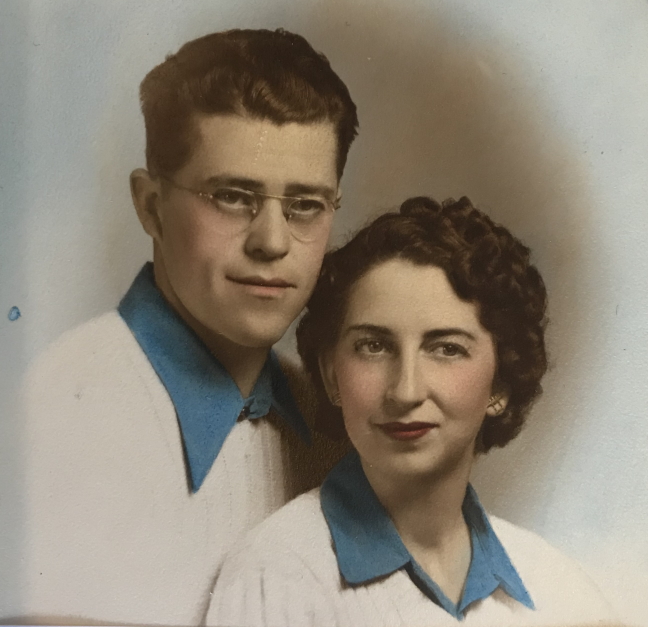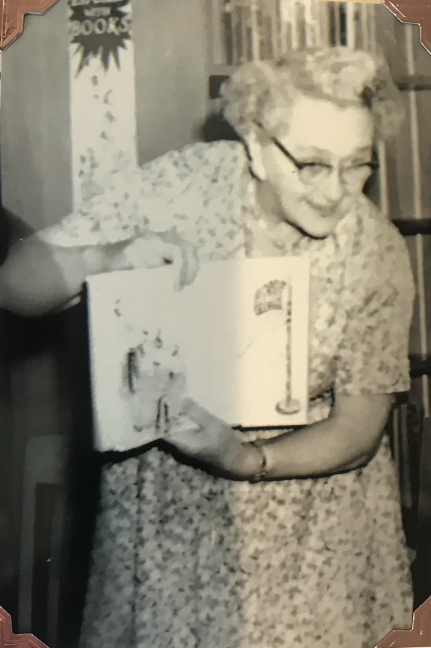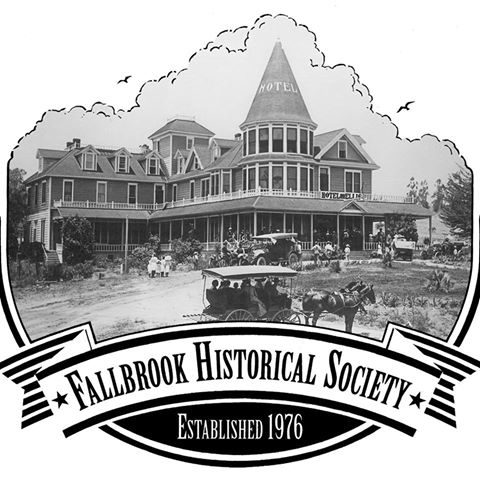Lorena Harris

The Fallbrook Historical Society’s Pioneer of the Year Award has been bestowed almost annually since 1977. Recipients are descendants of an early settler, or a long-time resident of Fallbrook, who have demonstrated a lengthy commitment to preserving and promoting the rich heritage of our town. Few would argue that the perfect candidate for the 2022 honor is founding member Lorena Geyer Harris.
Every part of her life, from birth to present day, is wrapped snugly in a Fallbrook memory with familiar names, places and events. Lorena’s birth, for example, took place in 1946 at the first Fallbrook Hospital, a converted private home on Main Street.

“There were four rooms,” she said. “A waiting room, a labor room, a delivery room and a heart patient room. It closed after the Fallbrook Hospital District was established in 1950 and a 20-bed hospital opened in 1960 on Elder Street.”
Her maternal grandparents, Elmer and Emma Chase arrived in Fallbrook in 1933 when Lorena’s mother, Eugenia, was in the seventh grade. Her paternal grandparents, Harry and Mildred Geyer, arrived in Fallbrook in 1930 when Lorena’s father, Jack, was in fifth grade.
“My parents both graduated from Fallbrook High School in 1938,” she said. “They were in the class that wrote the alma mater, named us the Warriors, chose the school colors of red and white, and so many other great traditions.”

Memories like these were passed down to Lorena from her parents and grandparents, encouraging her and her husband Tom to support the establishment of the Fallbrook Historical Society.
“Many of us – our early members – attended church together,” she said. “We all agreed that establishing a historical society was important, and so we began raising money and asking people to donate their collections that captured the history of Fallbrook.”
According to Lorena, a huge amount of work went into the initial setup of the research library.
“Early members like George Kelsey, Dode Martin, Jack Story, Don and Mary Rivers, Liz Yamaguchi, Marjorie Yackey and many others dedicated their lives to preserving the history of Fallbrook,” she said. “It was a lot more difficult doing research back then – no computers or Google. Working with the Rivers, we went through each high school year book and began indexing the students as far back as we could.”
“I started working on the old files about three or four years ago and began cleaning and reorganizing material,” she added. It was right up my alley.”
Despite her humbleness, Lorena has always been an active member of the organization, providing several historical items from her own family collection. In fact, one section of the historical society’s main museum is a tribute to both sides of her family.
A beautiful pink dress with delicately appliqued flowers is displayed on a mannequin by memorabilia from the 1935-36 California-Pacific International Exposition in Balboa Park. The dress was made by Lorena’s mother and grandmother.
“The entire community took part in the fair that year,” recalled Lorena. “There was a playwright who got the Fallbrook Women’s Club to recruit actors, dancers and other performers, and to make costumes. The play, ‘A Night in Old Mexico,’ featured my mom, wearing the pink dress and shoes, while dancing an authentic Mexican dance called Chiapanecas.”
An album, created by Lorena’s mother, also is on display. It details all the costumes and performances in perfect penmanship in white ink on black pages.
“She always wanted to donate the dress and album to the museum,” said Lorena. “I brought the items to the historical society a few years ago, and they have been a regular feature ever since.”
That’s not all Lorena gifted to the museum. Along the same wall where the dress and album can be found is her Aunt Nellie’s hand-stitched wedding dress, worn in 1886 when Nellie married Dr. Andrew Jones McKinney. Nellie, who played the hammer dulcimer, performed at Knott’s Berry Farm while in her 80s, sharing her pioneer experiences. Photos capturing these moments also are on display thanks to Lorena. There is also a photo of Nellie’s home – now home to Lorena and Tom.
Lorena’s close association with the Historical Society go even deeper.
“When I was growing up, my maternal grandmother kept house for Dr. Davies, who at that time owned and lived in the Pittenger House,” she said. “It was great when the historical society in 1981 purchased the farm house and the two-and-a-half acres on which it sits.”
Lorena’s love of history and the library was nurtured by her paternal grandmother from the time she was five years old.
“She used to take me to work at the public library,” she said. “That was my first ‘job’ and all I ever wanted after that was to be a school librarian.”
Lorena, also a graduate of Fallbrook High School, earned her bachelor’s degree in home economics and then a degree in library science from San Jose State University.

“My first real job was managing the inventory of the 13 libraries on Marine Corp Base Camp Pendleton,” she said. “But my dream came true in 1980 when I became the Fallbrook High School librarian.”
At the beginning of each school year, Lorena would give a presentation to freshmen students, explaining the different areas of the library.
“That was kind of boring,” she laughed, “so I started telling them about the history of Fallbrook and that really got their attention.”
Throughout the years, she saved many of the school newspapers. She had them bound and gave them to the historical society.
Lorena retired in 2012, but remains a strong presence at the historical society. She created the Fallbrook High School Homecoming Display in October 2021 and actively supports special events. Every season is an opportunity for her to bring pillows, banners and other decorations she creates to the museum.
“Fallbrook is such a big part of me,” she said. “It’s important to share its great history.”

NOTE: Lorena’s paternal grandmother, Mildred Geyer, was honored as Pioneer of the Year in 1992. She was the first San Diego County librarian, served on the Bonsall School Board and opened the school cafeteria with a federal grant to ensure native American children would be fed.






























